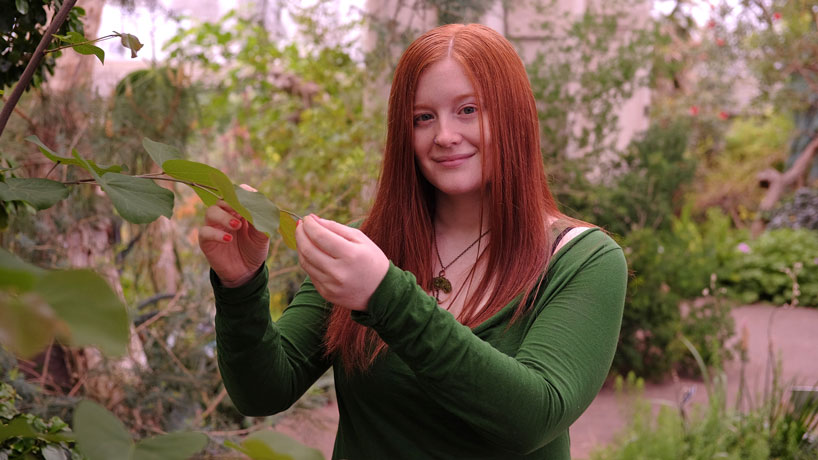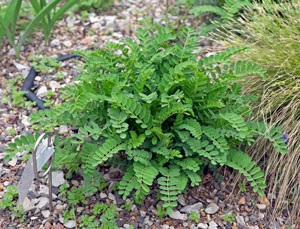
Senior biology major Rachel Becknell studied the endangered species commonly called Pyne’s ground plum through a research internship at the Missouri Botanical Garden’s Shaw Nature Reserve. (Photos by August Jennewein)
With a father who is the manager at Castlewood State Park and formerly the state horticulturist for Missouri, it would seem that Rachel Becknell was set on the path to study conservation biology. But that wasn’t the case for the University of Missouri–St. Louis senior who spent the last year on research at the Shaw Nature Reserve, owned and maintained by the Missouri Botanical Garden.
“I actually used to be terrified of nature and going outside,” said Becknell, who had ventured down other career paths, such as international studies, teaching English in Japan and veterinary science.
An introductory course on evolution science at UMSL hooked Becknell’s interest the way other studies hadn’t. She threw her efforts into conservation biology, specifically studying the endangered plant species Pyne’s ground plum.
“It’s a bean-type plant that grows along the edges of glades. It’s known only to eight or nine plant populations in Tennessee. I like to think of it as an indicator species of how the environment should be.”
She chose the research topic with the help of botanical garden experts Matthew Albrecht, assistant curator of conservation biology, and Quinn Long, a botanist and ecologist.
“We noticed the populations getting smaller and wondered what the cause of that was,” Becknell said. “We realized that, from previous surveys of the area a little over a hundred years ago, cedar trees were not a dominant species. Now, they have overtaken the forest and are providing too much shade for Pyne’s ground plums.”
She began her research to test that hypothesis in April 2014. It meant planting a “common garden,” which simulates the natural environment in a controlled setting. The garden had 324 plants and shade structures built by Becknell out of boards and cloth.
“I’m really happy that this project had a big field component to it,” she said. “They [Albrecht and Long] had a big hand in designing it, but I was the main person implementing it. I had to go out once a week and count the number of stems, the number of leaves, measure diameter and determine if a plant was alive or not. And sometimes it would rain, so I would be covering my papers, trying to get all my data in by the end of the day.”
In October, they dug the plants up to take root measurements and determined that, indeed, shade was preventing the growth of a healthy Pyne’s ground plum population.
“The solution is to cut some cedar trees down and do controlled burns,” Becknell said.
She believes in practical applications of research.
“I want to find solutions that work to restore environments but are also economical and realistic,” she said. “I like the practical side of it. Not just doing research for research’s sake.”
Becknell was awarded a Research Experience for Undergraduates position through the botanical garden which helped her complete the project for her senior thesis. REUs typically fund travel, housing and food for recipients of positions in research projects across the nation. Additionally, she received a $5000 summer stipend. Becknell also was awarded the 2014 Marcelle Kranzberg Undergraduate Research Award by the Whitney R. Harris World Ecology Center at UMSL, providing funds for supplies, conferences and her 40-minute commute to Shaw Nature Reserve each day.
Becknell recently attended Undergraduate Research Day at the state capitol in Jefferson City, Mo., where she presented her findings to politicians.
“I think it’s important to do things like this because it’s important for politicians to see what young scientists are researching and to see that science is really an integral part of our society.”
She appreciated networking and learning about her peers’ findings as well. Becknell believes in the power of shared knowledge.
She will start graduate school on June 1 with a teaching assistant position at Washington University in St. Louis and plans to study plant-soil interactions.
“I want to be a professor at a university, have my own research lab and also have connections to work with nonprofits and governmental organizations, so that the research I’m doing and the research that other people in the field are doing actually gets out there,” Becknell said. “Hopefully I make some difference.”
















